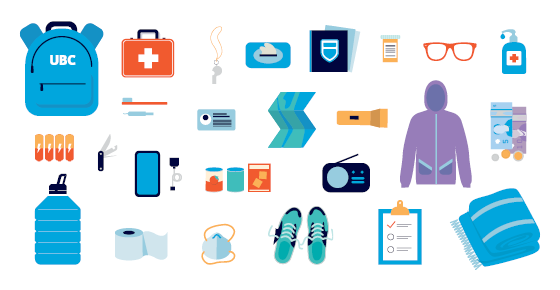Do you know what do in an emergency?

Safety & Risk Services’ Emergency Management team will be setting up a booth from September 3 and 4 to help increase the campus community’s resilience, emergency awareness and preparedness!
Stop by the Emergency Management booth on Imagine UBC on September 3 to learn more about emergency preparedness and the resources available to plan for emergency situations. Visit the Quake Cottage on September 4 to ride the free earthquake simulator that provides an educational experience of what it is like to go through a major earthquake.
September 3 – Imagine Day
Find our Emergency Preparedness booth on Imagine UBC at Main Mall, 1:00-4:00 pm
September 4
Find our Emergency Preparedness booth and ride the Quake Cottage, an earthquake simulator at University Commons outside the AMS Student Nest, 10:00 am–3:00 pm
We all have a role to play in an emergency
Emergencies happen, and as part of the UBC community, we all have a role to play in emergency preparedness. That’s why it’s important for each and every one of us to have the tools and know-how to prepare appropriately.
Preparing for an emergency does not need to be difficult. Start by getting informed about the risks in our community, make a plan, and then build a kit.
Get Informed
- Hazards & Risks may vary depending on your geographic location. You can find some of the hazards that may impact our community in our Emergency Response Plan.
- UBC Alert is the university’s mass notification system to send information in urgent situations that may pose an immediate safety or security risk to the community. Make sure your contact information is up-to-date on Workday to receive alerts and notifications in an urgent situation. Learn more about UBC Alert.
Get prepared
- Make a plan and review it with your loved ones. Ensuring you have a plan is the best way to protect yourself and your family. Identify a local meeting place for family and friends to convene after an emergency. List all personal contacts and choose a primary contact person, preferably out of province, who your loved ones can check in with. Learn more about making a plan
- Building your emergency kit doesn’t need to be expensive or take a lot of time. Having an emergency kit is invaluable after a disaster, and having one at home, in the car and at the office will ensure you’re prepared at all times. Learn more about building an emergency kit.
- Some of us are spending more time at home due to remote work, so getting your home ready for the unexpected is even more important. When our homes become our places of work, make sure you and your loved ones are safe. Learn more about preparing your home for an emergency.
- Departments/faculties should practice workplace preparedness. Although supplies are important, the planning around what to include in your emergency kit is even more beneficial when creating an internal culture of readiness. Start a conversation with faculty and staff, and encourage them to think in a holistic way about office preparedness. Emergency kits are unique to each individual because they may contain prescription medications, family contact information/plans, extra clothing, and cash — this is why departments are not responsible for providing kits. Make sure you’re prepared by having an emergency kit at work in addition to your kit at home and in your car. Learn more about departmental readiness
Take action
Having the knowledge, plans, and supplies you need to react appropriately to any, and all emergencies will not only give you a sense of assurance in a time of crisis, but it will also contribute to our community’s overall ability to respond and recover. Learn more about how to take action in an emergency situation.
Government of Canada resources